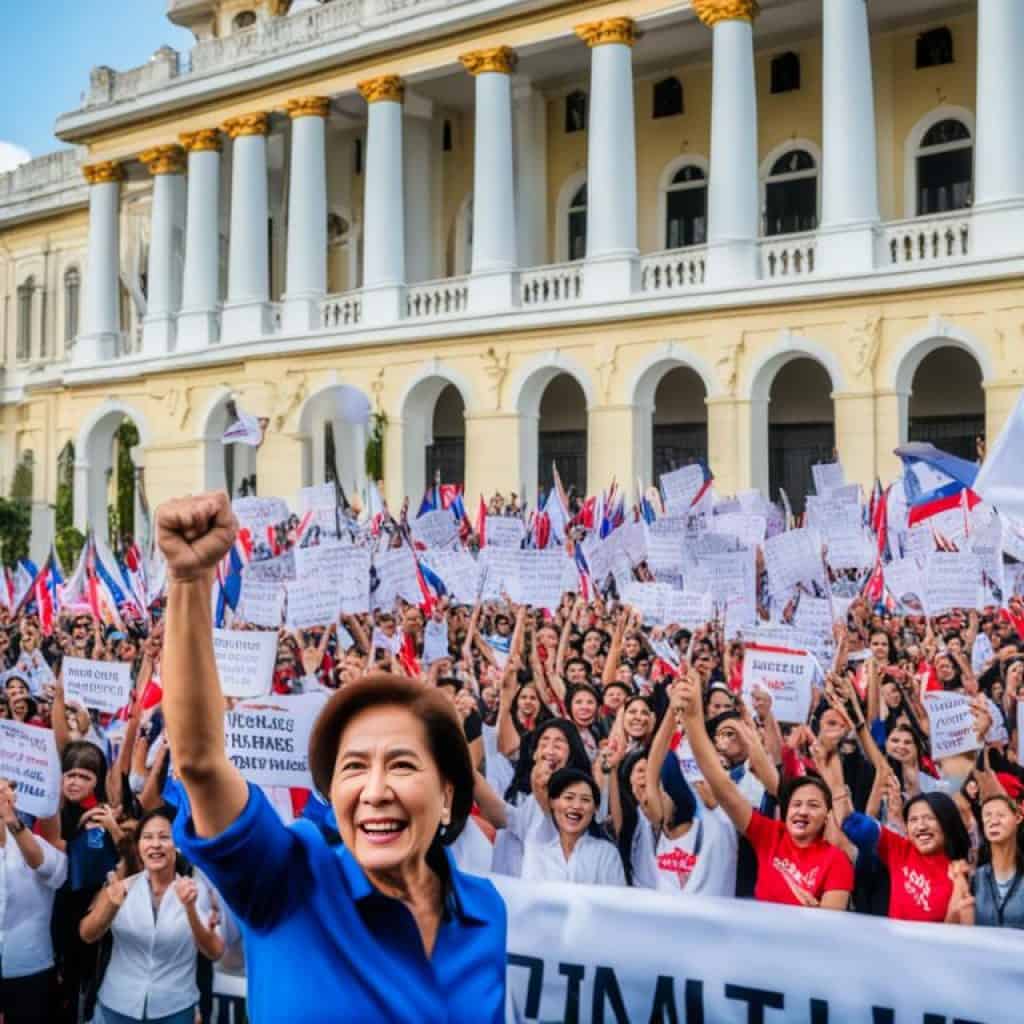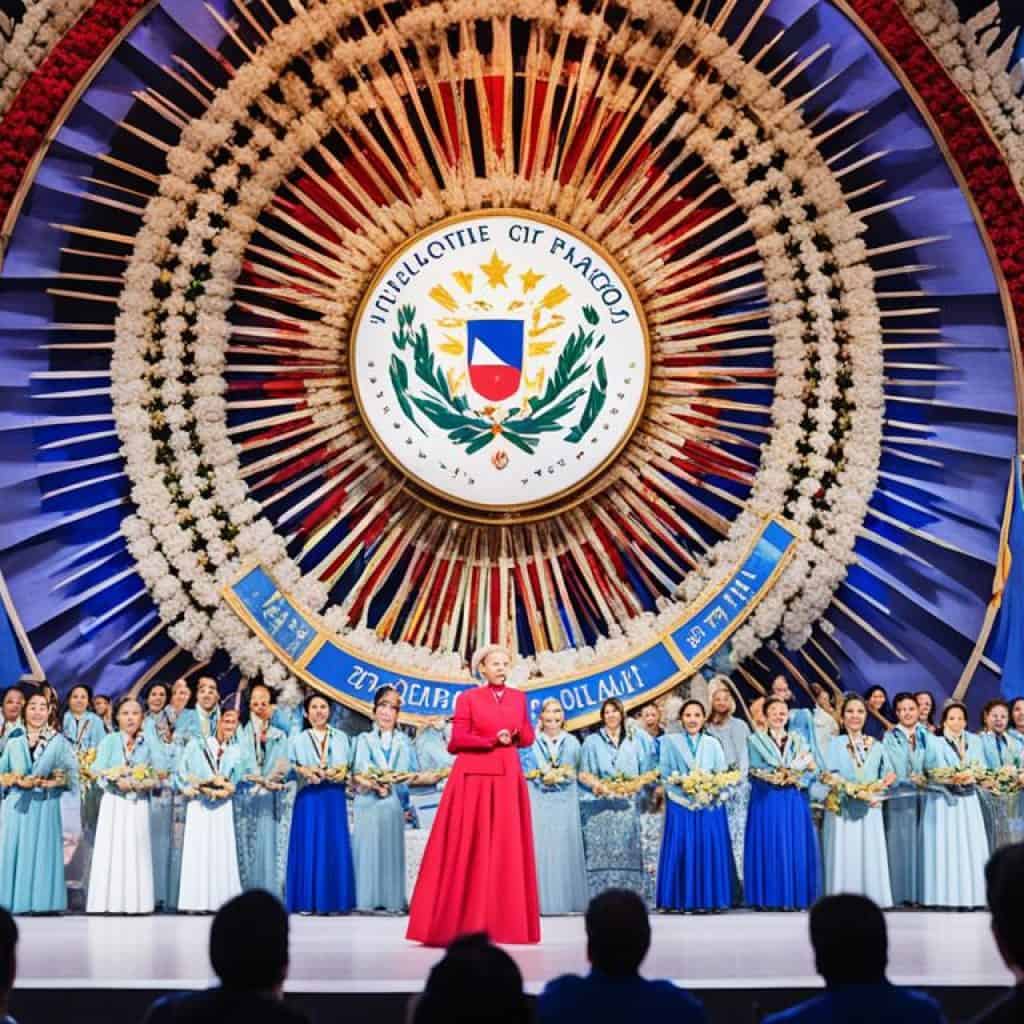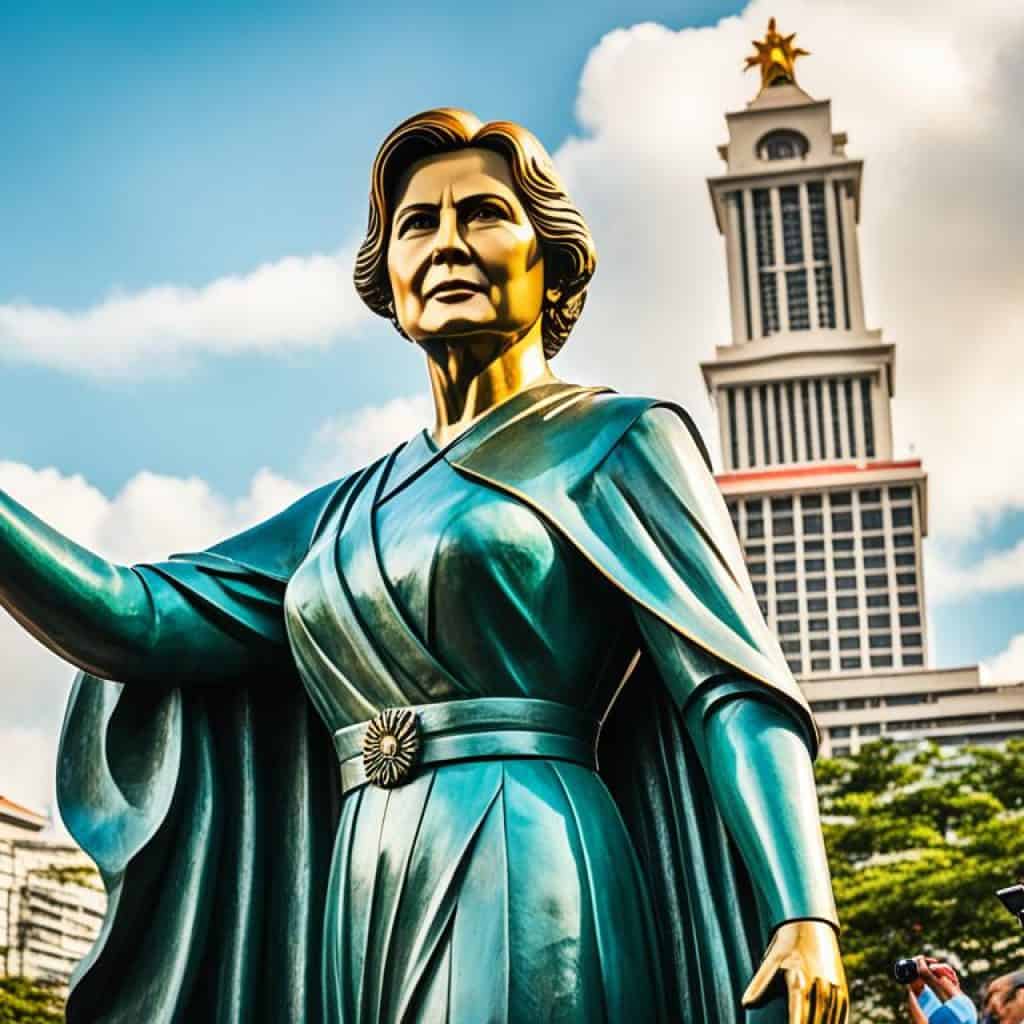Early Life and Education
In this section, we delve into the early life and educational background of Corazon Aquino, the first female president of the Philippines. Born on January 25, 1933, in Tarlac province, Philippines, Corazon hailed from the prominent Cojuangco family, known for its influence in politics and society. Her upbringing in a politically influential family laid the foundation for her future endeavors.
Corazon Aquino’s educational journey began at Mount St. Vincent College in New York, where she pursued her higher studies. This educational experience broadened her horizons and exposed her to diverse perspectives and ideas. She further enhanced her knowledge and skills by graduating from the prestigious College of Mount Saint Vincent.
Upon returning to the Philippines, Corazon Aquino continued her education at Far Eastern University, further solidifying her commitment to learning and intellectual growth. Her strong educational background equipped her with the necessary tools and knowledge to navigate the complex world of politics and leadership.
Family Influence and Political Awakening
Aside from her education, the Cojuangco family’s prominent political standing played a significant role in shaping Corazon Aquino’s worldview. The family’s involvement in politics introduced her to the intricacies of the Philippine political landscape and instilled in her a sense of duty and responsibility towards her fellow countrymen.
“My family has always had a strong dedication to public service. I witnessed firsthand the impact politics can have on people’s lives, and it was this awareness that ignited my passion for making a difference.”
Developing a Sense of Purpose
Corazon Aquino’s early life and education played a crucial role in developing her sense of purpose and dedication to public service. The combination of her educational background and exposure to a politically influential family instilled in her the belief that she could make a significant impact on her country and its people.
Throughout her journey, Corazon Aquino’s commitment to education and her family’s legacy guided her towards a path of leadership and service. These formative experiences laid the foundation for her future as the first female president of the Philippines and set the stage for her enduring legacy.
Marriage and Political Career of Benigno Aquino Jr.
Corazon Aquino married Benigno Aquino Jr., a prominent opposition politician, in 1954. She stood by his side throughout his political career, demonstrating unwavering support even during his imprisonment and subsequent exile in the United States. Benigno Aquino Jr. played a crucial role in opposing the Marcos government, which ultimately led to his assassination and served as a catalyst for galvanizing opposition against President Marcos.
Despite the risks and challenges they faced, Corazon and Benigno Aquino Jr. remained committed to fighting for democracy and defending the rights of the Filipino people. Their partnership and shared vision for a better Philippines were rooted in their deep commitment to democratic values and principles.
“The Filipino is worth dying for.”
Benigno Aquino Jr.’s political career was marked by his affiliation with the Liberal Party and his role as an outspoken opposition politician. He vehemently opposed the declaration of martial law by President Marcos in 1972 and was subsequently imprisoned for his political beliefs. After spending several years in detention, he was allowed to leave the Philippines in 1980 and seek medical treatment in the United States.
During his exile in the United States, Benigno Aquino Jr. continued to rally for support from the international community and garner global attention to the plight of the Filipino people under the Marcos regime. His determination and unwavering spirit inspired a nation, becoming a symbol of hope and resistance against oppression.
Benigno Aquino Jr.’s untimely assassination upon his return to the Philippines in 1983 served as a turning point in Philippine history. His death sparked outrage and ignited a wave of protest that eventually led to the downfall of President Marcos and the restoration of democracy.
Legacy and Impact
Benigno Aquino Jr.’s sacrifice and dedication to the Filipino people will forever be remembered as a pivotal moment in the country’s history. He played a significant role in shaping the political landscape of the Philippines, and his legacy continues to inspire generations of opposition leaders and activists.
His commitment to democratic values and principles serves as a reminder of the importance of standing up for justice, even in the face of adversity. The impact of his advocacy can be seen in the continued efforts of opposition politicians to protect the rights and welfare of the Filipino people.
| Key Contributions and Achievements | Details |
|---|---|
| Opposition Politics | Benigno Aquino Jr. was a prominent opposition figure, voicing his concerns and challenging the Marcos regime. |
| Imprisonment | He was imprisoned for his political beliefs and opposition to the Marcos government. |
| Exile in the United States | Benigno Aquino Jr. spent several years in exile in the United States, advocating for democracy and garnering international support for the opposition. |
| Assassination and Legacy | His assassination upon his return to the Philippines galvanized opposition against President Marcos and played a crucial role in the restoration of democracy. |
The People Power Revolution
In February 1986, the Philippines experienced a significant moment in its history with the People Power Revolution. At the center of this revolution was the presidential elections that took place, in which Ferdinand Marcos called for new leadership. Corazon Aquino emerged as the unified opposition’s candidate, standing up against the regime of Marcos.
Despite officially losing the election, Aquino and her supporters alleged electoral fraud and called for massive civil disobedience actions to protest against the unfair practices. This led to a non-violent mass demonstration movement that captured the nation’s attention.
The People Power Revolution gained momentum, drawing support from various sectors of society, including the Armed Forces of the Philippines and the Philippine Catholic Church. It became a powerful manifestation of the collective discontent and longing for change among the Filipino people.
“The People Power Revolution showed the world the strength and determination of the Filipino people, as well as their unwavering commitment to democracy and justice.” – Corazon Aquino
This peaceful revolution became a defining moment in Philippine history. The unwavering spirit of the people, their commitment to non-violence, and their demand for political accountability succeeded in ousting Marcos from power.

The People Power Revolution serves as a reminder of the power of collective action and the impact that non-violent mass demonstrations can have in bringing about significant political change. It demonstrated the strength of the Filipino people’s will to fight against oppression and restore democracy.
The events of the People Power Revolution paved the way for Corazon Aquino’s accession to the presidency, marking the beginning of a new era for the Philippines.
Presidency and Political Reforms
During her presidency, Corazon Aquino spearheaded crucial political reforms that reshaped the governance of the Philippines. These reforms included the drafting of the 1987 Constitution, which aimed to limit the powers of the presidency and restore the bicameral Congress.
To ensure a more accountable and transparent government, Aquino implemented economic policies that prioritized the free market and advocated for a responsible economy. These policies aimed to stimulate growth, attract investments, and create opportunities for the Filipino people.
Recognizing the importance of peace and stability, Aquino pursued peace talks to address the long-standing Moro conflict in the southern Philippines. Her efforts resulted in the establishment of the Autonomous Region in Muslim Mindanao, which aimed to grant self-governance to the Moro people while promoting unity and inclusivity.
Overall, Aquino’s presidency brought about significant changes that laid the foundation for a more democratic and progressive Philippines. Her commitment to political reforms, economic development, and peace initiatives continue to shape the country’s trajectory today.
Challenges and Controversies
Corazon Aquino faced numerous challenges and controversies during her presidency, which tested her leadership and resilience. From political turmoil to natural disasters, her administration was marked by various obstacles that required strategic navigation and steadfast determination.
Mendiola Massacre
The Mendiola Massacre, a tragic event that occurred during Corazon Aquino’s presidency, shook the nation and brought criticism towards her administration. At least 12 peaceful protesters were shot by Philippine state security forces during a peaceful demonstration near the Mendiola Bridge in Manila. This incident led to public outrage and raised questions about the government’s response to civil unrest.
Natural Calamities
In addition to political challenges, Aquino had to grapple with natural calamities that struck the Philippines during her tenure. The country experienced devastating events such as the 1990 Luzon earthquake, the eruption of Mt. Pinatubo in 1991, and the destructive Tropical Storm Thelma. These natural disasters caused significant damage and loss of lives, putting substantial pressure on Aquino’s administration to provide relief and recovery efforts.
Coup Attempts
Corazon Aquino’s presidency was also marked by multiple coup attempts by disgruntled military factions. These attempts to overthrow the government posed a constant threat to political stability and challenged Aquino’s leadership. While she successfully quelled these coup attempts, they created a climate of military uncertainty and highlighted the ongoing need for vigilance and reform within the armed forces.
Economic Problems
The Philippines faced significant economic challenges during Aquino’s presidency. The country struggled with high inflation, budget deficits, and a mounting external debt. Aquino’s administration worked tirelessly to implement economic policies aimed at addressing these issues and promoting a responsible economy. However, the road to economic recovery proved to be a complex and arduous journey.
Post-Presidency and Awards
After leaving office in 1992, Corazon Aquino’s contributions to democracy and peace were recognized with several prestigious awards and citations. Her post-presidency journey saw her honored as one of 100 Women Who Shaped World History and bestowed with the esteemed J. William Fulbright Prize for International Understanding.
Aquino’s unwavering commitment to restoring democracy and her trailblazing role as the first female president of the Philippines continue to resonate and hold great significance for the Filipino people. Her legacy as a transformative figure and champion of democracy remains an integral part of the nation’s history, inspiring generations to come.
Corazon Aquino receiving an award for her contributions to democracy and peace.
Impact on Female Leadership and Political Progress
Corazon Aquino’s presidency marked a significant milestone for female leadership and political progress in the Philippines. As the first female president, she inspired women across the country and became a symbol of empowerment. Aquino’s trailblazing role as a female leader paved the way for more women to pursue political positions and contributed to the ongoing progress towards gender equality and representation.
Under Aquino’s leadership, women in the Philippines gained a role model who shattered the gender barrier in politics. Her ascent to power demonstrated that women could hold the highest office in the land and make a lasting impact on the nation’s governance. Aquino’s achievement encouraged countless women to believe in their abilities and strive for leadership roles in various sectors.
Moreover, Aquino’s presidency served as a catalyst for women’s empowerment and participation in decision-making processes. With her at the helm, policies and initiatives were implemented to increase women’s representation in government and provide support for their socio-economic advancement. She recognized the importance of including diverse perspectives and voices in the political arena, fostering a more inclusive and equitable society.
Women’s Empowerment Initiatives during Aquino’s Presidency
Aquino’s commitment to women’s empowerment was evident in the initiatives and reforms enacted during her presidency. Some notable efforts include:
- Establishing programs to promote women’s rights, gender equality, and access to education
- Creating avenues for women to participate in decision-making processes through various government bodies
- Implementing policies that addressed gender-based violence and discrimination
- Encouraging the formation of women’s organizations to advocate for women’s rights and welfare
These initiatives not only elevated the status of women in Philippine society but also laid the foundation for continued progress in women’s empowerment and political participation.
“The empowerment of women is not just a simple phrase or mere political rhetoric, but an opportunity to build a better nation and create a more just society. Women’s voices and perspectives are crucial in shaping policies and decisions that affect our society as a whole.” – Corazon Aquino
Aquino’s leadership and accomplishments serve as an inspiration for women around the world. Her success in a traditionally male-dominated field demonstrated that women are capable of achieving remarkable heights and making meaningful contributions to society. She continues to be a role model for aspiring female leaders, illustrating the power of determination, integrity, and resilience in challenging societal norms and effecting positive change.
Recognitions and Honors
Corazon Aquino’s contributions and leadership have garnered widespread recognition and honors, both nationally and internationally. Her tireless efforts in championing democracy and her pivotal role in the peaceful People Power Revolution have solidified her importance in the annals of history as a transformative figure not only in the Philippines but also beyond.
“Corazon Aquino’s unwavering commitment to democracy and her indomitable spirit have left an indelible mark in the hearts and minds of the Filipino people and the world at large.”
In recognition of her enduring legacy, Time Magazine honored Corazon Aquino as one of the 20 Most Influential Asians of the 20th century, a testament to her profound impact on the political landscape of the Philippines and her influential role in shaping the course of history. Her recognition as a trailblazer and one of the most influential figures is a testament to her unwavering dedication and the importance of her contributions.
Corazon Aquino’s impact extends far beyond her tenure as the first female president of the Philippines. Her visionary leadership and steadfast commitment to democracy have cemented her place in history as a beacon of hope and an inspiration for future generations.

Recognitions and Honors
| Award/Citation | Year |
|---|---|
| One of the 20 Most Influential Asians of the 20th century (Time Magazine) | 1999 |
| J. William Fulbright Prize for International Understanding | 1996 |
| Ramon Magsaysay Award for Public Service | 1998 |
| One of 100 Women Who Shaped World History (Encyclopaedia Britannica) | 1999 |
Personal Life and Death
Corazon Aquino’s personal life was deeply intertwined with her political journey. She married Benigno Aquino Jr., a prominent opposition politician, and together they had five children. Their partnership and shared commitment to the betterment of the Philippines shaped their fight for democracy and progress.
In 2008, tragedy struck as Corazon Aquino was diagnosed with colorectal cancer. Undeterred by her illness, she embarked on a courageous battle against the disease, demonstrating the same resilience and strength she exhibited throughout her political career. Despite the challenges she faced, Aquino remained determined to make a positive impact on her beloved country.
Corazon Aquino fought her illness with utmost bravery and inspired countless others with her unwavering spirit. She used her platform to raise awareness about cancer and encourage individuals to seek proper medical attention. Aquino’s fight against cancer became a symbol of resilience and hope, uniting countless individuals in their own personal battles against the disease.
Tragically, Corazon Aquino passed away on August 1, 2009, leaving behind a profound legacy and a nation forever changed by her leadership and determination. Her unwavering commitment to democracy and her fight for the betterment of the Philippines continues to inspire future generations of leaders, pushing them to pursue positive change and make a difference in the world.
Continuing Influence and Monuments
The impact of Corazon Aquino continues to be felt through the numerous monuments and public landmarks dedicated to her throughout the Philippines. These tangible symbols serve as a testament to her enduring influence and the indelible mark she left on the nation.
As the first female president of the Philippines, Corazon Aquino’s legacy as the Mother of Philippine Democracy is celebrated and revered. Her contributions to political progress, particularly in the fight against authoritarian rule, remain significant and serve as a reminder of the power of leadership in shaping the course of a nation.
“The widow in yellow is president not only of our country but also of democracy.”
Corazon Aquino’s unwavering commitment to democracy and freedom during the tumultuous People Power Revolution made her an iconic figure in Philippine history. The overthrow of Ferdinand Marcos’ regime and Aquino’s subsequent rise to power marked a pivotal moment in the nation’s struggle for political change and laid the foundation for a new era of democracy.
The public monuments and landmarks dedicated to Corazon Aquino serve as reminders of her transformative leadership and provide inspiration for future generations. From statues and memorials to schools and roads named in her honor, these tributes stand as a testament to her enduring legacy and the impact she had on the Philippines and its people.
In recognition of her contributions, let us explore some of the notable monuments and landmarks dedicated to Corazon Aquino:
Monuments
| Monument | Location |
|---|---|
| Corazon Aquino Memorial Shrine | Tarlac City, Tarlac |
| Corazon Aquino Bust | Makati City, Metro Manila |
| People Power Monument | Quezon City, Metro Manila |
Landmarks
- Aquino Center and Museum – Tarlac City, Tarlac
- Corazon Aquino Elementary School – Quezon City, Metro Manila
- Corazon Aquino High School – San Juan City, Metro Manila
- Aquino Avenue – Manila/Cavite/Batangas, Calabarzon
These monuments and landmarks not only honor the memory of Corazon Aquino but also serve as reminders of the values of democracy, courage, and resilience that she embodied. They stand as testaments to the enduring influence of this remarkable leader and inspire generations to strive for progress, equality, and the betterment of society.

The First Female President’s Enduring Legacy
Corazon Aquino’s enduring legacy as the first female president of the Philippines is rooted in her commitment to female empowerment, political change, and the advancement of democracy. She broke barriers and paved the way for women in politics, leaving behind a lasting impact on the Philippine government and society as a whole. Her legacy continues to inspire the current generation of female leaders and advocates for progress and equality.
Empowering Women in Politics
Aquino’s presidency marked a significant milestone in the history of female leadership in the Philippines. As the first woman to hold the highest office in the country, she shattered gender norms and empowered women to participate in politics at all levels. Aquino’s ascent to power served as a catalyst, encouraging more women to pursue political careers and assert their voices in decision-making processes.
The enduring legacy of female empowerment initiated by Aquino extends beyond her time in office. Today, Filipino women continue to thrive in various political roles, from local government officials to senators and cabinet members. The impact of Aquino’s presidency on gender equality in the political sphere remains a testament to her unwavering commitment to empowering women.
Driving Political Change
“The Filipino is worth dying for.”
Aquino’s famous quote encapsulates her dedication to driving political change and restoring democracy to the Philippines. Her presidency marked a turning point in the country’s political landscape, as it brought an end to the authoritarian rule of Ferdinand Marcos. Aquino’s unwavering spirit and determination in the face of adversity inspired millions of Filipinos to rise up and fight for their freedom.
Under Aquino’s leadership, the People Power Revolution of 1986 emerged as a powerful force for change. The non-violent mass demonstration, supported by the military and the Catholic Church, led to the ousting of Marcos and ushered in a new era of democracy in the Philippines. Aquino’s legacy as a transformative leader who spearheaded this political revolution remains etched in history.
Advancing Democracy
Aquino’s enduring legacy is also marked by her significant contributions to the advancement of democracy in the Philippines. During her presidency, she oversaw the drafting of the 1987 Constitution, which placed limits on presidential powers and established a bicameral Congress. These constitutional reforms aimed to create a more balanced system of governance, ensuring that no single individual holds excessive authority.
In addition to institutional reforms, Aquino prioritized the pursuit of peace and stability within the country. She engaged in peace talks to resolve long-standing conflicts, such as the Moro conflict, and successfully established the Autonomous Region in Muslim Mindanao, which granted greater autonomy to the Muslim-majority areas in the Philippines.
| Legacy | Accomplishments |
|---|---|
| 1 | First female president of the Philippines |
| 2 | Advocate for women’s empowerment in politics |
| 3 | Driving force behind the People Power Revolution |
| 4 | Architect of constitutional reforms |
| 5 | Promoter of peace and autonomy in conflict areas |
Remembering a Trailblazer
The enduring legacy of Corazon Aquino as the first female president of the Philippines is a testament to her indelible impact on the nation. Her commitment to female empowerment, political change, and democracy serves as an inspiration for generations to come. The path she forged continues to guide future female leaders in their pursuit of progress and equality. Aquino’s legacy remains alive, perpetuating her vision of a more inclusive and vibrant democracy in the Philippines.
Conclusion
Corazon Aquino’s presidency marked a historic moment in the Philippines, as she became the first female president and played a vital role in driving female leadership and political progress. Her legacy as a symbol of empowerment and her contributions to democracy continue to inspire generations.
Aquino will be remembered as a transformative figure in the history of the Philippines, leaving behind an enduring legacy that serves as a source of inspiration for women in politics and beyond. Her ascent to power shattered gender barriers and opened doors for more women to pursue leadership positions in the Philippine government.
As the Mother of Philippine Democracy, Aquino’s dedication to upholding democratic principles and her advocacy for social justice remain influential today. Her legacy serves as a reminder of the power of individuals to effect change and create a more equitable society. Corazon Aquino’s impact on the Philippines and her role in advancing female leadership will continue to shape the nation’s political landscape for years to come.


















Add comment